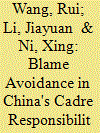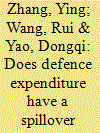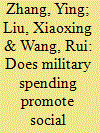|
|
|
Sort Order |
|
|
|
Items / Page
|
|
|
|
|
|
|
| Srl | Item |
| 1 |
ID:
181136


|
|
|
|
|
| Summary/Abstract |
This article contends that prior research on the behaviour of Chinese local cadres pays limited attention to their motivation for avoiding blame. Using qualitative data from three field studies conducted in Guangdong province, the study focuses on blame avoidance in the cadre responsibility system, which is recognized as an important instrument for state capacity building. Our analysis uncovers three major discursive strategies used by grassroots cadres to manage blame either before or after it is apportioned: de-legitimating performance standards, re-attributing blame and transferring blame risk. We find that local cadres have a role as blame makers in shifting blame and accusations. This finding challenges the conventional view, which typically sees local officials as blame takers. The article concludes by elaborating on the wider implications of this finding and proposing avenues for future research.
|
|
|
|
|
|
|
|
|
|
|
|
|
|
|
|
| 2 |
ID:
128442


|
|
|
|
|
| Publication |
2014.
|
| Summary/Abstract |
As regards the dual goals of additionality and sustainability, some clean development mechanism (CDM) projects were successfully registered while some were rejected by the Executive Board (EB). This paper focuses on two final statuses of these projects and aims to explore the potential determinants of CDM activities. Based on the Chinese samples of the rejections and registrations, we find that (1) according to the financial barrier analysis with the internal rate of return without CDM, the additionality is the most important and robust rule of CDM activities and the CDM projects successfully registered are more additional than the rejected ones in China; (2) the sustainability is another important determinant of CDM activities in China and Chinese CDM activities are sustainable in terms of size, while the EB is criticized for its selection of unsustainable CDM projects in terms of cost-effectiveness on emission reductions within a long period or in terms of hydropower plants; (3) some other factors including the prices of sale electricity and certified emission reductions, the generating capacity and installed capacity all tend to pose significant impacts on the final status of each project that features the CDM activities in local areas of China.
|
|
|
|
|
|
|
|
|
|
|
|
|
|
|
|
| 3 |
ID:
155845


|
|
|
|
|
| Summary/Abstract |
China’s defence expenditure has been growing rapidly along with GDP growth during the past two decades. Meanwhile, the income gap has continued to increase. There are conflicting views regarding whether the defence expenditure is capable of reducing income inequality. Therefore, this paper investigates the existence of any spillover effect of defence expenditure on income inequality, with a special focus on the regional differences among 31 provinces and 7 military regions in China. We extend panel cointegration and the impulse response function by using panel data during the period of 1997–2012. The empirical results show that the defence expenditure has an impact on income inequality, and the effect varies over different regions in China. The defence expenditure has a spillover effect on income inequality in the full sample panel and the southeastern panel. An increase in the defence expenditure does not crowd out social welfare spending due to the high level of economic development and government expenditure. On the contrary, in the northern panel, the effect is opposite because of the unbalanced economic development levels within the panel. Beijing as the capital of China, benefits more from the expansion of defence expenditure thus widening the income gap. In addition, the impulse response analyses further confirm a stronger effect of the defence expenditure on income inequality in the northern and the southeastern panels over a short period.
|
|
|
|
|
|
|
|
|
|
|
|
|
|
|
|
| 4 |
ID:
155841


|
|
|
|
|
| Summary/Abstract |
Whether military spending is capable of promoting social welfare is currently a controversial issue. The aim of this paper is to investigate how military spending affects the input and output of social welfare (i.e. social welfare expenditures and social welfare index). A panel cointegration analysis and an impulse response function are conducted with multi-country panel data, over two time periods, 1998–2011 and 1993–2007. In addition, to extend a comparative analysis over different economies, BRICS (i.e. Brazil, Russia, India, China, South Africa) and G7 (i.e. the US, Japan, Germany, the UK, France, Italy, Canada) countries are selected as representatives of emerging economies and developed countries, respectively. The empirical results show that military spending enhances social welfare expenditures in developed countries, while the effect is ambiguous in emerging economies. Also, military spending is capable of promoting the social welfare index based on the FMOLS estimation. The comparative analyses indicate that unlike in the G7, the effect of the growth of military spending on the growth of social welfare expenditures is negative and shorter in the BRICS.
|
|
|
|
|
|
|
|
|
|
|
|
|
|
|
|
|
|
|
|
|